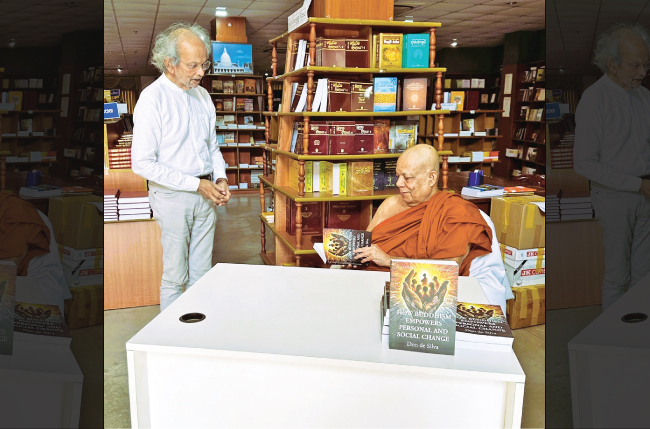London based author Don de Silva recently launched his book titled ‘How Buddhism empowers personal and social change’. The book is an interesting read and I truly learned a lot. It is value for money and presented in a simple but alluring style of writing. I was able to sit and discuss the book with the amiable author, who is also a Buddhist chaplain. He explained “I was a director of the United Nations Environment Programme (UNEP). I was part of UNEP’s communication team, establishing global media strategies and action programmes to create awareness about environmental issues: for example, about climate change and the vital and critical links between development, the amelioration of poverty and sustainable development.
During the early 1980s, I was part of the UNEP team for Asia and Pacific, based in Bangkok, which provided assistance to establish the Central Environmental Authority in Sri Lanka”.
He went on to add” I strongly feel that the experiential and authenticated teachings of the Buddha Dhamma are critical to meet the existential challenges in the world. Embracing the profound wisdom of Buddha Dhamma has become an exhilarating journey for me, intertwining seamlessly with my passion for social service. The dynamic teachings, grounded in both experience and authenticity, have proven to be a transformative guide in navigating the intricate challenges of our existence. With fervor, I believe that weaving the threads of Buddhism into the fabric of social service is not just a choice, but a vibrant necessity to address the profound questions that life throws our way”.
Buddhist Chaplaincy
De Silva spoke about his education on Buddhism saying “After many year of working with UNEP, I moved to London to work with the International Institute for Environment and Development (IIED). I have read and studied books about Buddhism all through my career working life.After “retirement”, I followed an advanced course in Buddhism, which was conducted at a temple in London. I also did a course in Pali. I completed a course in Buddhist Chaplaincy and also hold a Teachers Training Certification in Mindfulness Based Stress Reduction (MBSR), which was put together by Emeritus Professor Jon KabatZinn, from the University of Massachusetts in the US.
I asked him about his motivation to write this amazing book? He smiled and said “There appears to a major gap between what the Buddha said and did and what is practiced as “Buddhism” is many parts or the world today. I started to write this book about 2 years ago. I tested out some of the material in my Facebook posts to see what the response from my Facebook friends might be.
The overall response was very encouraging and positive. It gave me the motivation to craft a book like this together.It is difficult to summarise the impact of the work of Venerable Kirama Wimalajothi Thera. He is the founder President of the Buddhist Cultural Centre. Venerable Wimalajothi Thera embodies core teachings of the Buddha: change starts with oneself, but also the Buddha’s call: from personal change to societal change, impacting and serving society. Venerable Wimalajothi Thera encapsulates the core teachings of the Buddha.
The core message of the book in a nutshell – The book invites you to heed the Buddha’s call — “EhiPassiko” — to come and see, to experiment with the teachings without blind belief. Explore the voluntary nature of Buddhist precepts, emphasising that they are not rigid commandments but flexible guidelines for a fulfiling life. Dive into the practical tools for change provided by the Buddha, such as the Four Noble Truths, the Eightfold Path, and Bhavana, the art of cultivating the mind. The book points out that each of us also has positive characteristics within us — compassion, care and concern — to counter the negative, greed, hatred and delusion.
Societal progress
These 358 pages, with over 90 illustrations, serve as a guiding light, not just for personal enlightenment but as a compass for societal progress. As you delve into the stories within, let them inspire you to tread gently on this shared earth, fostering empathy, understanding, and a profound sense of responsibility for the environment.
In concluding our chat I asked the author what advice he had for young readers.His stated “The authentic and experiential teachings of the Buddha can play a major role in helping you in your life and career. Take time to study the core teachings of the Buddha. The Buddha Dhamma highlights the interdependence of phenomena and the need for people to live in harmony with the environment. Through the teachings of the Buddha, you can deal with hindrances and fetters that drain your potential and unleash your talents and skills. You don’t have to go to that very expensive self-development course.
The Buddha and his disciples, monks and nuns, tackled critical issues, pertaining to society, such as: caste, race, exclusion, poor governance, abject corruption, gender, the liberation of women, trafficking of women and girls, unsustainable, wasteful living, abuse, war and conflict and mental health. These experiences are vital to secure your future”. This book is a must read for all those who like to learn about Buddhism.
Dishan Joseph






